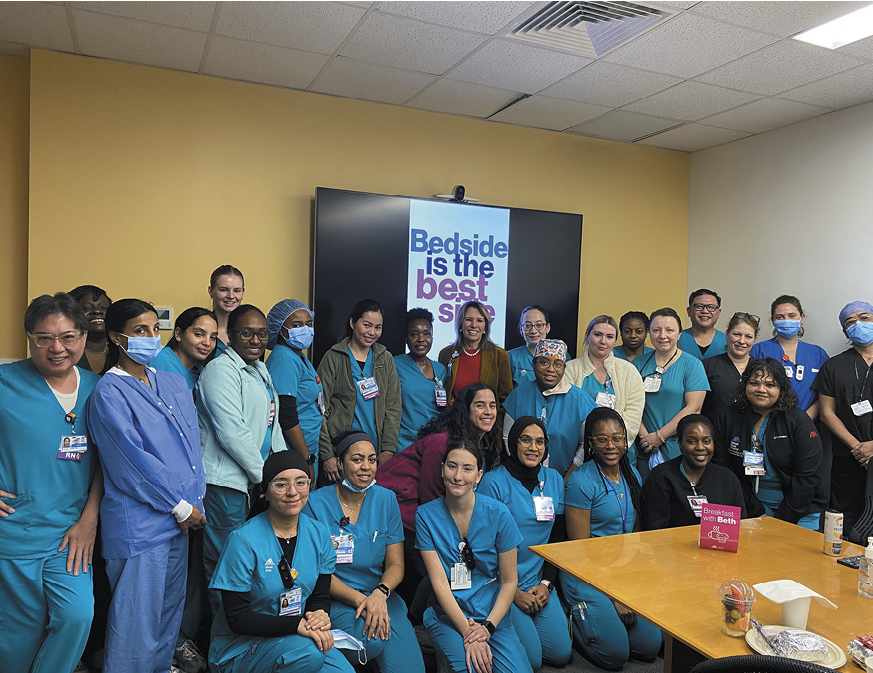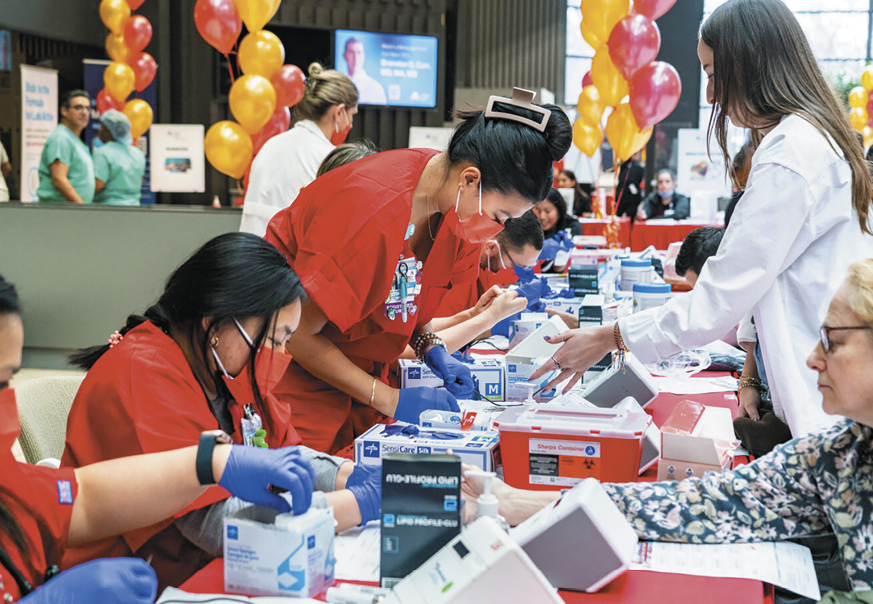- Home
- Media Kit
- MediaJet
- Current Issue
- Past Issues
- Ad Specs-Submission
- Reprints (PDF)
- Photo Specifications (PDF)
- Contact Us
- PRIVACY POLICY
- TERMS OF USE
![]()
ONLINE
![]()
ONLINE

Creating Excellence Together
Editors’ Note
Dr. Beth Oliver, DNP, RN, FAAN is responsible for the practice of nursing across Mount Sinai Health System and collaborates with the senior executive team as well as Chief Nursing Officers throughout Mount Sinai. For more than 29 years, Oliver has been a transformational cardiac nurse leader at Mount Sinai, currently also serving as the Senior Vice President of Cardiac Services for the Health System. In this role, she leads cardiovascular service line strategy and operations for the Health System while also ensuring the delivery of quality care to Mount Sinai Heart patients. In addition to her Mount Sinai leadership roles, Oliver directs numerous cardiovascular health-related community outreach programs in partnership with the American Heart Association. In July 2018, Oliver was appointed President of the American Heart Association’s Board of Directors in New York City, becoming the first nurse to hold the position of Board President. She received her MS from Columbia University and her DNP from Case Western Reserve University. Oliver is a Fellow of the American Academy of Nursing.
Institution Brief
Mount Sinai Health System (mountsinai.org) encompasses the Icahn School of Medicine at Mount Sinai, the Mount Sinai Philips School of Nursing and eight hospitals, as well as a large and expanding ambulatory care network. The eight hospitals – Mount Sinai Brooklyn, The Mount Sinai Hospital, Mount Sinai Queens, Mount Sinai St. Luke’s, Mount Sinai South Nassau, Mount Sinai West, New York Eye and Ear Infirmary of Mount Sinai and Mount Sinai Beth Israel – have a vast geographic footprint throughout the New York metropolitan region.
How do you describe Mount Sinai Health System’s culture and values?
Mount Sinai Health System is grounded in core values that include Equity, Safety, Teamwork, Empathy, and Agility. These values are integral to guiding our mission and shaping our vision. Our mission is to promote health and wellness by bridging relationships within our local, national, and global communities through advocacy, education, and scientific nursing research. Our vision is to be the place where nurses choose to work, and patients want to receive their care. These core values and guiding principles are in alignment with our relationship-centered care nursing professional practice model and is the foundation of our culture, which has helped steer us towards our employee value proposition; “Mount Sinai Nurses: Creating Excellence Together.”
What have been the keys to Mount Sinai Health Systems’ industry leadership and how do you define the Mount Sinai difference?
Our leadership in healthcare really comes down to our strong dedication to innovative medical research and the latest technologies. At Mount Sinai, we bring this to life with our multidisciplinary teamwork. By bringing together experts from different fields, we ensure the best patient outcomes and set new industry standards. This collaborative approach is crucial because it combines our collective expertise, creating an environment where innovation can flourish through teamwork and shared goals.
Building on this teamwork, Mount Sinai Nursing shows our commitment to innovation with our specialized Innovation Units. These units are like testing grounds for new ideas and technologies, helping us refine and validate our approaches before rolling them out across the system. Our current projects include using artificial intelligence to predict potential complications, improving our processes for better efficiency, and trying out different care models through virtual nursing.

Chief Nurse Executive Dr. Beth Oliver facilitates
“Breakfast With Beth,” a series of informal sessions
engaging frontline nurses or nurse leaders throughout
the Mount Sinai Health System. Together, they collaborate
on innovative solutions to enhance patient care
and optimize nursing workflows.
Will you provide an overview of your role and areas of focus?
As the Chief Nurse Executive, my role centers around overseeing the nursing strategy and ensuring that it aligns with our broader organizational goals. Given the current workforce challenges, I am acutely focused on recruitment and retention. Successfully attracting and maintaining a dedicated nursing staff is crucial for enhancing engagement within our teams. Full engagement among staff is essential, as it directly influences their ability to provide compassionate, safe, and high-quality care, which is our ultimate aim.
Will you highlight Mount Sinai Health System’s national reputation for excellence in nursing services?
Unique among health systems, Mount Sinai includes the Phillips School of Nursing and the Center for Nursing Research and Innovation. These institutions are pivotal in strengthening our national nursing pipeline and advancing evidence-based research. The Phillips School of Nursing cultivates skilled nursing professionals, while the Center for Nursing Research and Innovation (CNRI) focuses on conducting groundbreaking funded studies that enhance clinical practices and patient care. Together, these entities enable Mount Sinai to lead in both educational excellence and clinical innovation, furthering our mission to transform healthcare on a national scale.

Under Dr. Beth Oliver’s leadership, Mount Sinai Fuster
Heart Hospital commemorates 20 years of Go Red for Women’s
Heart Health. Nurses lead the charge in providing vital
community health screenings, touching over 200 lives
with services like blood pressure checks, BMI screenings,
and vital health education.
How is Mount Sinai Health System supporting and advancing the professional development of its nurses?
At Mount Sinai Health System, we are deeply committed to the professional development of our nurses, recognizing that their growth is fundamental to the advancement of our healthcare services. To support this, we have recently launched a pioneering program called the “‘Nurse Leader Academy.” This initiative is designed to equip nurse leaders with crucial business skills such as drafting business plans and managing large-scale projects, skills that are essential for today’s healthcare environments.
Furthermore, we are enhancing our staff’s practical skills through cutting-edge simulation learning. Our new simulation center represents a significant investment in hands-on education, providing nurses with a safe, realistic environment to hone their skills, practice complex procedures, and improve their clinical capabilities before interacting with patients. This approach not only boosts their confidence, but also ensures that we maintain the highest standards of patient care.
Will you discuss Mount Sinai’s commitment to build a diverse and inclusive workforce?
Mount Sinai Health System is steadfast in its commitment to cultivating a diverse and inclusive workforce, a pledge that is deeply rooted in our core value of equity. This value compels us to create a diverse and inclusive environment for our patients, students, and colleagues free from bias, racism and favoritism, to foster optimal care and just opportunities based on one’s individual needs and abilities.
In collaboration with Mount Sinai’s Department of Diversity, Equity, and Inclusion, our nursing department has implemented several key strategies to strengthen this commitment. For instance, we have established a committee named “Nurses Against Racism,” which addresses and works to eliminate racial prejudices and challenges that our nurses may encounter. Additionally, we have introduced a high school “Nursing Pathway Program.” This six-week paid internship offers high school students hands-on experience in an inpatient hospital setting, fostering a multigenerational exchange of ideas and perspectives that enrich our understanding and approach to patient care. It is also noteworthy that well over half of our CNRI funded studies are DEI focused.
Do you feel that there are strong opportunities for women in leadership roles in the industry?
In the healthcare industry, particularly within nursing, which is predominantly female, women are well-represented in nurse leadership roles at the executive level. However, there is still considerable room for growth, especially in the highest ranks of healthcare administration, such as CEO and COO positions.
At Mount Sinai Health System, we acknowledge this gap and are committed to fostering an environment where women have equal opportunities to ascend to these top executive roles. We actively support the advancement of women in our workforce through leadership training, mentorship programs, and by creating pathways that ease the transition to higher executive roles.
Did you know at an early age that you had a passion for nursing and what has made the profession so special for you?
From a young age, I felt a profound calling to help others, which ignited my passion for nursing. My journey in healthcare began in my teenage years when I first started working as a housekeeper in a nursing home. I soon transitioned to a nurse’s aide, learning from licensed practical nurses. It was there that I observed the pivotal role nurses play in patient care. This experience was instrumental in shaping my career path. What truly makes nursing special to me is the significant impact we have on the health and well-being of our patients. Nursing transcends traditional medical treatment; it involves holistic care that considers the physical, emotional, mental, and spiritual health of each individual. The ability to contribute positively to someone’s life in such a comprehensive manner is deeply fulfilling and continually reinforces my commitment to this noble profession.
What advice do you offer to young people interested in pursuing a career in medicine?
As Chief Nurse Executive at Mount Sinai Health System, I would advise young individuals considering a career in medicine to start by volunteering in a hospital setting. This exposure is invaluable as it allows you to immerse yourself in the medical environment and understand the day-to-day responsibilities and challenges faced by healthcare professionals. By volunteering, you gain firsthand experience that can help you determine if a career in medicine aligns with your interests and personal strengths. Additionally, this experience not only enriches your understanding, but also strengthens your future applications to educational programs in the medical field. Engaging directly with the healthcare setting is indeed key to discerning whether this path is the right fit for you.![]()